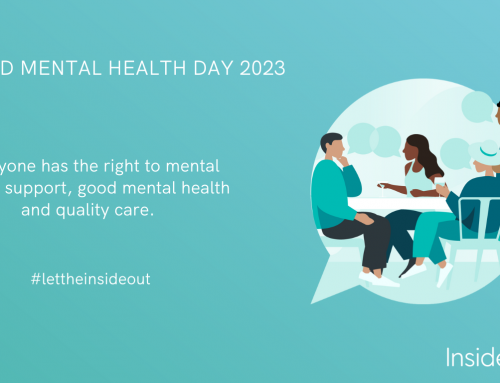Accessing support nowadays has become much more accessible compared to just a few years back. Furthermore, the flourishing of online mental health support platforms, such as InsideOut, has drastically cut down the time one has to set aside for therapy or coaching sessions, which now can easily be accessed in the comfort of one’s home.
With 1 in 4 adults experiencing a mental health challenge at any given point in time, accessing support to nurture and maintain positive mental health is crucial. During a global pandemic this becomes an especially pressing issue. 75% of people with a diagnosable mental illness receive no treatment and women are much more likely to access support than men (WHO).
The DSM-5 (Diagnostic and Statistical Manual of Mental Disorders) classifies close to 300 mental health disorders. The most common challenges people face nowadays are anxiety and depression. Mixed anxiety and depression has been estimated to cause one fifth of days lost from work in Britain (Mental Health Foundation). In the UK alone, between 2019 and 2020, the NHS implemented programme IAPT recorded 1.69 million referrals to talking therapies for treating anxiety and depression. This showed an increase up to 5.7% compared to the previous year (NICE).
Different elements can trigger a mental health challenge. Mind, the mental health charity, identifies four main areas that impact our mental health: physical, emotional, environmental and chronic stresses can all be root causes of the way you feel (Mind).
Seeking professional support can be a daunting experience. It might trigger fears of the unknown or of being stigmatised as ‘weak’ or ‘different’. Being vulnerable and opening up to a complete stranger can be a less than ideal prospect on most days, let alone when you’re feeling like you’re struggling to cope. That’s why it’s key to take the time to find the right mental health professional for you. If you feel you can trust your therapist and explore sides of your emotional inner landscape together, that’s a good sign.
Having many questions before starting therapy or coaching is normal. Here are some of the most commonly asked questions.
Who can I reach out to?
As you realise that you are unwell, you might fear stepping out of your comfort zone and embracing your potential, possibly for the first time. Unlike talking to a friend or family member, talking to a psychotherapist or life coach offers you the opportunity to discuss your thoughts and feelings with a professional who is external to the dynamics and situations that are challenging you.
While it is important to recognise that psychotherapists and life coaches have different trainings, they will both support you in gaining further insight into a specific area of your life. In very general terms, psychotherapy usually focuses on more in-depth work, addressing your past to understand your present better, while coaching focuses on your future and on how you can act differently in your present to achieve your future goals. A coach can help you identify limiting beliefs, improve your time management skills and goal setting. While in your work with a psychotherapist, you are not expected to know what the end goal of your sessions will be, as sessions often have an exploratory nature. The therapeutic and coaching relationship both offer you opportunity to find your own answers and solutions and start dealing with difficulties more effectively.
By interacting with a psychotherapist or coach, you can gradually start seeing things from new perspectives and find a sounding board for your deepest thoughts, fears and emotions. Psychotherapists and coaches will not spoon-feed you with answers or advice. They will support you in finding new answers to your questions by promoting self-reflection and insight on your behaviour and thought patterns. For this process to occur, it is important for you to find a therapist or coach who you feel you can trust, and who is going to be able to walk alongside you while you venture on this rich and often complicated journey of self-exploration.
Is the investment worth the cost?
The cost of accessing support is a key element that keeps people from getting the support they need. A fundamental part of therapy, and coaching at times, is having regular (usually weekly) sessions especially to begin with. The ramifications of this work can often have positive impact not only in your personal life but also in your professional and financial life in the long run. Working with a therapist or a coach is an investment in your wellbeing, health and happiness.
Is therapy supposed to be easy?
During therapy you usually explore sides of your life and your past that you don’t engage with on a daily basis. This could be linked to past trauma or negative experiences linked to behavioural patterns that need addressing. Whatever the reason that brings you to seek support, it’s absolutely normal to find that the process isn’t always easy. If you don’t like your therapist, always discuss this with them. You might be projecting onto the therapist parts of you that you don’t like, or they might remind you of someone that was difficult to deal with in your life. Give therapy and coaching a good try before giving up on the process.
How many sessions do I need?
There are differences in the kinds of therapy. Counselling for example usually focuses on your behavioural patterns and symptoms and can last between 6 to 24 weeks. Psychotherapy on the other hand focuses more on the root of the problem and usually lasts longer. The specific amount of sessions that are needed depends on the unique relationship that you and your therapist have and the time it takes to unearth the issues that are causing your distress. Coaching usually is a shorter intervention compared to therapy. You might choose to work with a coach for a few weeks or months, or check in with them at key miles stones in your life.
Can I access therapy online?
Online therapy is rapidly growing in popularity and allows anyone to access support from the comfort of their own homes. You might like this setting or prefer to meet your therapist in person when possible. Some therapists will offer only online support while others will be open to meeting in person. Always choose what feels right for you. This is your time and you should feel at ease as much as possible while going through this unique process. While obviously some elements of human interaction are lost in online therapy, research shows that the outcome is just as valuable as in-person therapy.
How can therapy help me?
Therapy can help you understand yourself better, enhance your sense of self-esteem, confidence and intuition. Through therapy you can learn how to interpret your thought and behavioural patterns and find new coping strategies or positive thinking. If you’ve experienced trauma, therapy can support you in processing the traumatic experience and gaining control over your situation. There are many different forms of therapy and finding the right one for you is key. Familiarising yourself with the different approaches you can find is a key part of starting your journey towards recovery. The most common form of therapy is Cognitive Behavioural Therapy, also knows as CBT, but there is a wide range you can explore via various sources such as the NHS website.
InsideOut can help you find the right mental health expert, so that you can receive the support you need and enhance your ability to cope with life’s challenges. To access support, download the InsideOut App on your smartphone and start by completing the questionnaire. You’ll then be matched with three mental health experts within 24 hours. You now have the option to book your first consultation session with the therapist or coach of your choice.
Clients that have accessed support via InsideOut have said:
“I instantly felt at ease around Sarah who was able to listen to my story, help me unearth my deeper emotions and process the event clearer in my mind.” Amy, NHS
“Choosing InsideOut and working with you was the best decision that I could have made. I appreciate and thank you for your guidance that helped me both mentally and emotionally during the tough times I have been through. You made me discover myself through your advice and guided me to reading more and discovering my inner strength. I am happy to recommend your services.” Claudia, NHS
“InsideOut has been such a light in a dark time.” Jessica, Headstart
“Got a lot of benefit from it, and liked having someone to discuss about topics that are not covered in other social settings. Sessions helped me to introspect a lot more.” Mannuel, Headstart
Author: Sarah Speziali, Chief Therapist at InsideOut
Insta: @lettheinsideout






